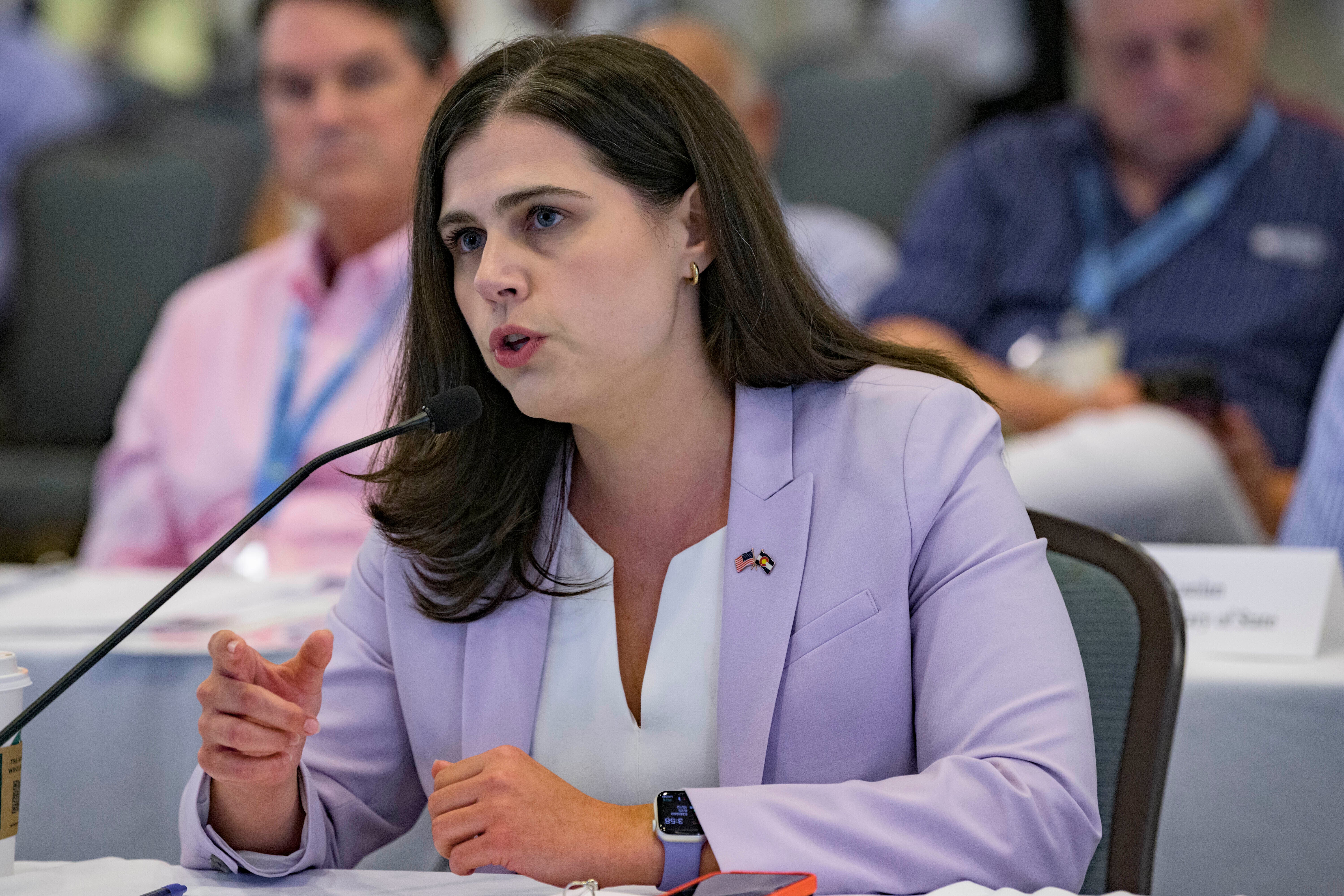‘Evolving and deepening’ antidemocratic threats could ignite election chaos, officials and experts warn
Secretaries of state and voting rights experts warn against an explosion of legislation to ‘subvert’ election outcomes and a wave of prominent election deniers running for office
Last year, Republican state lawmakers passed at least 32 new laws in 17 states to change the rules of election administration, strip oversight from election officials and put it into the hands of GOP-controlled legislatures.
Within the first seven months of 2022, GOP-controlled legislatures introduced at least 244 such bills. Twenty-four became law, according to a new report from States United Democracy Center and Protect Democracy, a nonpartisan organisation supporting democratic elections.
That state-level effort – supported by Donald Trump’s baseless narrative that the 2020 presidential election was stolen from him and false claims that voter fraud and manipulation damaged the results – “would make it far easier for hyperpartisan actors to stir up the doubt, chaos, and confusion that could be used as a pretext for election subversion,” according to the report.
Election experts and elected officials are also sounding the alarm, warning that the explosion of legislation – and a wave of prominent election deniers running for office to put it in place – give antidemocratic actors the tools to do what spurious attempts to overturn the 2020 results could not, and with a greater chance of success.
Victoria Bassetti, senior counsel with States United Democracy Center, said the “evolving and deepening” trend of election subversion has matured and gone mainstream among Republican officials.
“When you dig in and look at the details of these 244 bills, what it shows is that the perverse creativity of election subversion is growing,” she told reporters in a briefing this week.
The report highlights legislation that falls within five categories: requirements for partisan-driven reviews of election outcomes, shifting election oversight to partisan officials, setting “unworkable burdens” for administration, and imposing severe penalties on election workers who commit offences that were previously routinely used to help voters.
In a recent interview with The Guardian, Colorado Secretary of State Jena Griswold warned that Republicans’ antidemocratic agenda seeks to “undermine free and fair elections for the American people, strip Americans of the right to vote, refuse to address security breaches and, unfortunately, be more beholden to Mar-a-Lago than the American people.”
Ms Griswold, who also serves as the president of the Democratic Association of Secretaries of State, said that such an agenda succeeding with Republican victories in November could see Americans “lose the right to vote in less than three months.”
In testimony to Congress this month, Michigan Secretary of State Jocelyn Benson said that “these threats are a direct extension of the efforts to spread false information about the security and accuracy of our elections that we’ve all endured since the polls closed” in the 2020 presidential election.
“Through blatantly false press releases, purely political legislative hearings, bogus legal claims and so called ‘affidavits’ that failed to allege any clear evidence of wrongdoing, those unhappy with the results of the 2020 presidential election have perpetuated an unprecedented, coordinated campaign to erode the public’s confidence in one of the most secure, accessible and transparent elections in our history,” she said in written testimony to the US Senate Judiciary Committee.
“And now that effort is being supported by political candidates who are courting the support and coveted endorsements of the people perpetuating those dangerous theories,” she said.

Every primary race in August and September has at least one person running for secretary of state – typically a state’s chief elections official – who has denied the results of the 2020 election.
Of the secretary of state primaries this year, more than half include an election denier, and roughly one in four candidates won their primaries.
Arizona’s Mark Finchem, who said he would not have certified President Joe Biden’s victory in the state, is the GOP nominee for secretary of state heading into November.
Michigan’s Kristina Karamo baselessly claimed to have witnessed voter fraud in that state’s election in 2020. She is now the GOP’s nominee for secretary of state.
Pennsylvania’s far-right Republican nominee for governor Doug Mastriano, a key figure in the former president’s attempts to challenge and subvert the outcome of the 2020 presidential election in the battleground state, will appoint the secretary of state, if elected in November.
A separate report earlier this year from the Brennan Center for Justice found that one in six election workers has been threatened because of their job, revealing the “damaging” and “sustained” attacks against people who help run the nation’s elections and put the business of “election administration and our democratic system in serious danger.”
More than half of poll respondents reported harassment on social media, on the phone, or while on the job.
Election offices in at least nine states have already seen a wave of departures and early retirementst heading into November’s general elections.
All three top elections officials in one Texas county resigned, two months before early voting begins, citing threats to their jobs and reports of stalking.
Anti-democratic efforts could have a “chilling effect on both voters and election officials,” with legislation “essentially treating the places Americans vote like crime scenes,” according to Megan Boler Bellamy, vice president of law and policy at Voting Rights Lab.
Criminalising historically nonpartisan election worker roles while also underfunding elections and making it harder for poll workers and administrators could force workers out of their jobs and weaken election systems, posing an “urgent threat to democracy,” she said.

Olivia Troye, a former homeland security and counterterrorism adviser to then-Vice President Mike Pence, said any resulting chaos in election administration could make election systems and voters more vulnerable to foreign interference and manipulation by exploiting disarray with disinformation campaigns that could lead to violence.
Officials in several jurisdictions this year have already tried to refuse to certify valid election results, what experts say are early attempt to “[probe] the electoral system for weaknesses.”
“As we look to 2022 and 2024 and beyond, we think it’s important to understand the full landscape of threats to our democracy,” Ms Bassetti said. “This election subversion trend is a shocking and conscious effort to undermine the fabric of democracy.”
Join our commenting forum
Join thought-provoking conversations, follow other Independent readers and see their replies
Comments


Bookmark popover
Removed from bookmarks